YES Mooc UPB: Unterschied zwischen den Versionen
Keine Bearbeitungszusammenfassung |
Keine Bearbeitungszusammenfassung |
||
| (74 dazwischenliegende Versionen von 2 Benutzern werden nicht angezeigt) | |||
| Zeile 1: | Zeile 1: | ||
<big>'''<big>Welcome to the YES MOOC!</big>'''</big> | |||
<big>'''YES - Youth Engagement in Society'''</big> | |||
- | |||
- provide youth workers, youth educators and youth organisations with insights in the tool. | |||
[[Datei:YES-Logo.jpg|miniatur|center|YES Project Logo]] | |||
In this MOOC we will provide you with information about the use of the Serious Game YES. | |||
This game is a free dabating game which you can use without any charge or cost. | |||
You will find the YES Serious Game here: http://yes-cards.dev-lg.de/ | |||
This MOOC was created within the YES – project. | |||
YES is and acronym for "Youth Engagement in Society". | |||
YES is an international project in the EU education program ERASMUS+. | |||
[[Datei:UPB-Germany wp logo large - jpg.jpg|miniatur|center|UPB Chair Logo]] | |||
[[Datei:IngeniousKnowledge Logo jpg.jpg|miniatur|center|IngeniousKnowledge Logo]] | |||
[[Datei:Logo grande TDM 2000.jpg|miniatur|center|TDM 2000 Logo]] | |||
[[Datei:Logo Terram Pacis.png|miniatur|center|Terram Pacis Logo]] | |||
[[Datei:Erasmus+logo mic.jpg|miniatur|center|ERASMUS+ Logo]] | |||
<br /> | |||
__TOC__ | |||
<br> | |||
== Information about the YES MOOC== | |||
In this section you find information about the main target group, the aims of the MOOC, | |||
the outcomes and the idea and the structure of the YES MOOC. | |||
=== Main target group === | |||
The main target groups of the MOOC are: | |||
* youth workers | |||
* youth educators | |||
* youth organisations | |||
* YES users | |||
* people who are interested in Serious Games | |||
=== Aims of the YES MOOC === | |||
The aims of this MOOC are to | |||
* provide youth workers, youth educators and youth organisations with insights in the tool. | |||
* provide information how to use the Serious Game in educational contexts. | |||
* describe the discussion models which are supported by the YES tool. | |||
* show examples of the screens. | |||
* provide pedagogical and didacticsl hints. | |||
* share discussion ideas and topics. | |||
* raise awareness for the use of Serious Games in Youth education. | |||
=== Outcome === | |||
The learners/target group of this Mooc will | The learners/target group of this Mooc will | ||
* learn about the rules and discussion formats of YES. | |||
* get in touch with the concept of Serious Games. | |||
* solve tasks to get deeper knowledge about the YES card deck game. | |||
* focus on European topics as an example of possible topics for YES discussions. | |||
* rethink their way of training. | |||
- learn about the ERASMUS+ project YES. | * learn about the ERASMUS+ project YES. | ||
=== Aims and structure of the YES-MOOC === | |||
This MOOC will make it easy for youth workers to find the YES tool and to learn about how to use it to teach their learners productive debate skills that are essential for participating in politics and active citizenship in Europe. | |||
You, the trainers and youth workers, should be able to get an idea why YES is good and useful for youth groups. | |||
That´s why we decided to provide information and learning activities about: | |||
> the idea of YES | |||
> the game formats and settings | |||
> the types of cards and an introduction to the demo card sets | |||
> the structure and the course of the game (Screenshots and descriptions) | |||
> the importance of preparation and follow-up sequences | |||
> the link to our Website and to the YES Tool | |||
So, let´s start! | |||
== Introduction == | |||
When we are talking about modern and innovative ways of learning, game-based approaches and serious games are becoming more and more popular and every generation has its own needs. The young people are living in a quickly changing digital world. They are used to modern technology and old traditional forms of learning are not looked upon as attractive as they used to be. That´s why digital game based learning has become more and more popular over the years. Just a look at the use of smart phones, tablets and computers in the daily life of youth provides several good reasons for this. | |||
The YES approach, which we present in this MOOC, is such an innovative learning opportunity, which takes the changes in possibilities and the environment into account: | |||
YES is a serious game which supports discussions processes. | |||
Learning always happens with the resources. Moreover, learning processes usually happen under time restrictions. Overall, it can be stated that the basic conditions of learnings are very different. | |||
In addition to that, it is the duty of youth workers, teachers and trainers to prepare the young learners. The learners deal with new media in their daily life and they are involved in a European international environment. So, they have to deal with the opportunities and challenges they face in their real life environments. The young people are embedded in situations in society and the labour market and there mobile devices and new media have already a fixed place. They are standard and part of an increasing trend of digitisation. Learners should be prepared for standard situations and that´s why we decided to provide teachers and trainers with this book on new developments and dealing with mobil learning in teaching and learning scenarios. | |||
Teachers have to become aquainted to new media and innovative game-based learning approaches: So, welcome to the YES-MOOC. | |||
== About the ERASMUS+ YES project == | |||
This MOOC is focussing on the YES Serious Game. And, this game was designed in the YES project. | |||
[[Datei:YES-Logo.jpg|miniatur|center|YES Project Logo]] | |||
The project was funded by the European Union: | |||
[[Datei:LogosBeneficairesErasmus+RIGHT EN.jpg|miniatur|ERASMUS+ Logo]] | |||
To get more information about this project you can have a look at the YES project website: | |||
[http://eduproject.eu/yes/en/ Link zur YES Website] | |||
=== The main objective of YES? === | |||
The main objective of YES is to create, implement, test, and evaluate a game-based online tool and system (like a deck-building card game) for debating European topics in teams. In YES, the system proposed is a game-based tool in form of a beautifully animated online card-game that aims to encourage debates about politics and society amongst youths. Youths will form teams that could consist of school classes or mixed international teams. | |||
The system essentially offers an online-environment for holding well-structured debates about societal or political issues that uses a gamification approach to encourage young people of different ages to get involved. Therefore, a card-game mechanism that foresees the learners to build teams to play against each other builds the very basis of the system. | |||
=== Why creating a game/tool for youth with such a specific topic? === | |||
Due to the current political events, such as terrorist attacks at various places, BREXIT, the euro crisis or the migration problem, it is of particular importance that the youth realizes that they as citizens of Europe have an influence on the future and therefore Europe, too. They as a unit have the opportunity create the future of Europe or more likely that they are the future of Europe and that they should participate to lead the lives they want in the future. To ensure this one way could be to present and include them in current situations in Europe is to give them a playful opportunity to increase their knowledge and their opinion on certain European matters such as the YES tool does. | |||
The main idea of YES? | |||
The YES tool provides a learning method in the field of Game-Based Learning. The basic idea of the YES serious game in this project, is to foster active citizenship and provide information about Europe and offer active work and discussion on a game-based approach. The teams have to prepare their own deck of cards with different statements that are appropriate to strengthen or defend one's own position creating cards with special functions (such as argument and counter-argument). This makes the whole system highly flexible as there isn't any limit in the number of teams that are playing against each other nor is it in the number of young people gathering to build a team. | |||
“Games and serious games as well, are a massive part of youth work, they provide a chance to introduce people, have fun energize youngsters, but also has an important aspect of education, based on learning by doing principle.” (Beutner, Jakunaite, Rüscher 2018) | |||
=== The aims of YES: Which skills and competences will be fostered with YES? === | |||
First of all, the young learner get topic related knowledge. | |||
They discuss a specific topic when they use the YES tool. The topic can be selected by the youth workers / trainers and the learners. So the learners gather knowledge and competences and become skilled in the chosen topic. YES focused European Citizenship and politics by creating the demo Card Decks in this fields. For young European people it is useful and important to become active citizens, to know about European ideas, European culture and co-operation. But, the youth workers and learners can also integrate other topics in the game. | |||
Beside of the knowledge about the selected topic which will be discussed through YES, youngsters will also gain very important additional competencies: | |||
* Communication in the mother tongue | |||
* Communication in foreign languages | |||
* Mathematical competence and basic competences in science and technology | |||
* Digital competence | |||
* Learning to learn Competence | |||
* Social and civic competences | |||
* Sense of initiative and entrepreneurship | |||
* Cultural awareness and expression | |||
== What kind of debating models does YES offer? == | |||
An aim of YES is to foster certain competences and skills of youth through team interactions throughout the game. To debate/discuss various topics, in this case on the EU, enables the youth to develop or train specific skills and competences. | |||
[[Datei:Debating models.jpg|miniatur|Debating models of YES]] | |||
Discussion model, representative model as well as the election model. | |||
# In the discussion model one team will play against another team to win the game. A discussion with pros and contras of a certain topic will take place. One team taking the pro-side as the other team takes the contra-side. | |||
# In the representative model a debate with up to five different teams will take place. Each team will be represented by a single person which will argue on a certain position regarding a pre-determined topic. Such a setting is comparable to a talk-show or TV debate. | |||
# In the election model a debate with up to five different teams will take place to simulate an election, this has to be handled in some kind of split-session by the tool. | |||
=== Multiple-Choice concerning dicussion models === | |||
<div class="multiplechoice-quiz"> | |||
'''How many discussion models do we have in the Serious Game YES?''' | |||
(!1) | |||
(!2) | |||
(3) | |||
(!4) | |||
</div> | |||
<br /> | |||
... | |||
=== Text task concerning Card Deck Games === | |||
<div class="lueckentext-quiz"> | |||
"In the YES Serious Game we are learning to '''prepare''' discussions and '''discuss''' topics within a '''Card Deck Game'''. | |||
A Card Deck Game is very common between young learners. The know it from breaks at '''school''' and from the '''playground'''. | |||
Examples for other popular Card Deck Games are the game '''Magic''' from the US, or the '''Pokemon''' from Japan." <br /> | |||
</div> | |||
== Using the YES Serious Game == | |||
YES is unique because it is the first time active citizenship is fostered by a game-based approach based on a deck-building card game. | |||
There are some measures and projects which focus on active citizenship like (CIAC- CIAC – Creativity and Innovation for active citizenship,, CIVIC MIMDS, GOAL – Granting Opportunities for Active Learning, PPP - People Power Participation, VOICE – Developing citizens etc.) but the always stick to traditional courses or concept design. Only a few focus on online learning but this is typically not done in a synchronous way in these approaches. Moreover, none of these approaches include real game-based approaches and innovative online debating systems (we did a research on 30 project about active citizenship - you can find them under http://de.youropa-project.eu/projektauswahl/30-ausgewahlte-projekte/). | |||
But, YES uses game aspects which are focusing on elements of deck-building card games with which the learners are typically familiar with and combines this with learning about Europe and active citizenship. | |||
The young people are used to playing deck-building card games or collectable card games with real cards such as POKEMON, Yu-Gi-Oh, Digimon, Magic the Gathering, StarWars, Game of Thrones, etc. or on online platforms or apps (ASCENSION, DECK Heros etc.). | |||
We use the motivational aspect of such a game structure which is played by millions of young kids and youths over Europe and put it in a completely new context. | |||
=== Multiple-Choice concerning the use of YES === | |||
<div class="multiplechoice-quiz"> | |||
'''What is special about YES?''' | |||
(!YES is a traditional eLearning approach) | |||
(YES is a serious game which fosters the motivation.) | |||
(!YES is a video approach.) | |||
(!YES is a game with real paper cards.) | |||
</div> | |||
<br /> | |||
... | |||
=== How the debate works === | |||
The objective of the YES is to encourage productive debates that authentically reflect the way how societal or political debates take place in real life, always having the claim to foster learning about the discussed topics in mind. | |||
There are three steps to take in the YES approach and the use of the YES game: | |||
[[Datei:Phases of the YES Approach.jpg|miniatur|Phases of the YES Approach]] | |||
Hence, the first step to do would be to prepare the debate. | |||
'''Research on the topic = Preparation phase''' | |||
Therefore, the learners conduct research to the debate's topic, they search for background information and facts, and they have to prepare arguments and counter-arguments that will then be written down on the cards. Here, the learner gather knowledge and competences in the field they have to discuss. | |||
This requires the learners to anticipate the argument and counter-arguments of the other teams as well which pretty much implies the extent of research necessary to undertake by each of the teams, particularly when playing with more than only two teams. But, this also shows that the research process itself and all of its outcomes are highly valuable for the learners, which is why resources of high quality, prepared materials, summaries that have been created, etc. should be stored and kept available. Prepared materials that weren't a part of the cards could also be made available to other learners or even teachers as some kind of Open Educational Resource. | |||
'''The debate = discussion and game phase''' | |||
In the second phase the debate itself starts after the preparation took place. When thinking of a debate in which a pro- and a contra-team compete against each other, the one side could start with an argument for their side. The other team could play a card with a counter-argument that specifically targets the argument that was drawn before. Deciding which card to play is a democratic process which has a time limit (as mentioned in the noted above). When it's the team's turn the members can choose which card to play and once they have a majority the card will be turned over and added to the official timeline of the debate. This will encourage discussions among the team members. At the end of each game can be public voting (election model). Instead of just asking to vote for a winner the trainer also should focus the votes on the quality of the elements produced and how well they compare against the other one. This way we can come up with a point system that will tell us who won the debate at the end of all the rounds. | |||
'''The debriefing = reflection phase''' | |||
The reflection is an important part for youth groups as well. The trainers discuss with their youth groups the discussion and the argumentation path. They reflect on the topic and share experiences. If the learners were for example discussing on a European topic, this is the point were additional material can be provided because now the group is open for news and is able to improve their arguments, ideas and can enhance their competences and knowledge. Moreover, different views and positions can be taken into account and a reflection about argumentation strategies can be provided. | |||
'''General hints and technical aspects''' | |||
The fact that teams will have to anticipate the arguments of the other side means that they will have to look at the debated topics from more than one side in order to be successful. Not only will they learn structured, respectful and productive debating skills, they will also develop a deep understanding of the topics that they debate. | |||
From a technical point of view the system is hosted on a server. There is no need to download software or plug-ins because the system will run in every modern browser and is therefore, easily accessible. | |||
=== Multiple-Choice concerning the YES debates === | |||
<div class="multiplechoice-quiz"> | |||
'''How many phases are there in a typical use of YES?''' | |||
(!1) | |||
(!2) | |||
(3) | |||
(!4) | |||
</div> | |||
<br /> | |||
... | |||
=== The YES Cards of a deck === | |||
There are different types of Cards in the YES Card deck game: | |||
==== The core dabating cards ==== | |||
'''Argument cards:''' | |||
to provide a first argument in a dabate | |||
'''Counter argument cards:''' | |||
to provide an answer to a giver argument and provide | |||
a new own argument based on that | |||
==== The special cards ==== | |||
'''Time card:''' | |||
to get some time to do additional research before providing an answer | |||
'''Lie Card: Lying and Protesting''' | |||
it looks like a core dabating card and offers the chance | |||
to provide a wrong statement for example a so called ´scientic information´ which fosters your argumentation but which is not real and correct. | |||
If this card is played the other group can uncover it by a protest: | |||
* If the protest is correct and it was a lie. The lying group looses the round of the debate immedialtely. | |||
* If there is a protest and the card played was not a lie card but a real argument the protesting group looses immediately. | |||
* If there is no protest the card is like a real argument. | |||
'''Stealing Card''' | |||
offers the opportunity to steal a dabating card of the other group | |||
'''Destroying Card''' | |||
offers the opportunity to destroy a card you like of the other group which gets out of the debate | |||
'''Recycling Card''' | |||
offers the opportunity to get back an agurment you already played | |||
=== Crossword concerning cards === | |||
Click with your mouse on the numbers of the crossword and you will get a dialog with the question and a chance to fill in the correct answer. | |||
<div class="kreuzwort-quiz"> | |||
{| | |||
|- | |||
| Lie || If you play this card the other group will be able to protest against it! | |||
|- | |||
| Destroying || If you play this card you will delete a card of the enemy group! | |||
|- | |||
| Stealing || If you play this card you will take a card from the opponent! | |||
|- | |||
| Time || If you play this card you won´t have to hurry any more! | |||
|- | |||
| Recycling || If you play this card you will be able to get an already played card back! | |||
|} | |||
</div> | |||
<br /> | |||
== How to register for the YES Serious Game == | |||
=== Video - How to register for the YES Serious Game === | |||
Find here a video concerning the registration at the YES Game: | |||
{{#ev:youtube | https://www.youtube.com/watch?v=_d3dxzzgG5Y | 300 | center}} | |||
=== ´Search and Find´ concerning the registration === | |||
<div class="suchsel-quiz"> | |||
*Find the words! ''(horizontal, vertical and diagonal)'' | |||
*To show a word, just go with your mouse on it and mark it. | |||
*Help: We are searching for the words: ''Serious, Game, register, name, email, gamemaster, YES, and login''. | |||
<br /> | |||
{| | |||
|Serious | |||
|- | |||
|Game | |||
|- | |||
|register | |||
|- | |||
|name | |||
|- | |||
|email | |||
|- | |||
|gamemaster | |||
|- | |||
|YES | |||
|- | |||
|login | |||
|} | |||
</div> | |||
<br> | |||
... | |||
=== Video: Introduction to the YES Serious Game === | |||
Find here a video concerning the YES Game and how it works. | |||
It provides information how to play it: | |||
{{#ev:youtube | https://www.youtube.com/watch?v=8ojC2lMwV98&feature=youtu.be | 300 | center}} | |||
=== Screenshots from the YES Serious Game === | |||
[[Datei:1 Registration.jpg|miniatur|center|Registration]] | |||
[[Datei:2 Adding Team 1.jpg|miniatur|center|Adding Team 1]] | |||
[[Datei:3 Addding Team 2.jpg|miniatur|center|Adding Team 2]] | |||
[[Datei:4 Edit Team.jpg|miniatur|center|Edit Team]] | |||
[[Datei:5 Add Game.jpg|miniatur|center|Add Game]] | |||
[[Datei:6 Gamemaster Add a Game-min.jpg|miniatur|center|Gamemaster Add a YES Game]] | |||
[[Datei:7 Gamemaster Topics.jpg|miniatur|center|Gamemaster Topics]] | |||
[[Datei:8 Gamemaster Add Topic.jpg|miniatur|center|Gamemaster Adds Topic]] | |||
[[Datei:9 Player Prepare and Play Game.jpg|miniatur|center|Player Prepare and Play Game]] | |||
[[Datei:10 Player Teams and Invitations.jpg|miniatur|center|Player Teams and Invitations]] | |||
[[Datei:11 Player Prepare Cards.jpg|miniatur|center|Player Prepares Cards]] | |||
[[Datei:12 Player Add Card.jpg|miniatur|center|Player Adds Card]] | |||
[[Datei:13 First Card played.jpg|miniatur|center|First Card played]] | |||
[[Datei:14 Three Cards played.jpg|miniatur|center|Three Cards played]] | |||
[[Datei:15 Player Protest.jpg|miniatur|center|Player Protest]] | |||
[[Datei:16 Special Cards.jpg|miniatur|center|Special Cards]] | |||
[[Datei:17 Use Steal Card.jpg|miniatur|center|Use Steal Card]] | |||
== Good bye and the link to the YES Serious Game== | |||
Thank you for your interest in the YES MOOC. | |||
Now enjoy the MOOC Game. | |||
Just follow this Link to the YES Serious Game: | |||
http://yes-cards.dev-lg.de/ | |||
Aktuelle Version vom 8. Januar 2019, 17:09 Uhr
Welcome to the YES MOOC!
YES - Youth Engagement in Society

In this MOOC we will provide you with information about the use of the Serious Game YES. This game is a free dabating game which you can use without any charge or cost.
You will find the YES Serious Game here: http://yes-cards.dev-lg.de/
This MOOC was created within the YES – project.
YES is and acronym for "Youth Engagement in Society".
YES is an international project in the EU education program ERASMUS+.



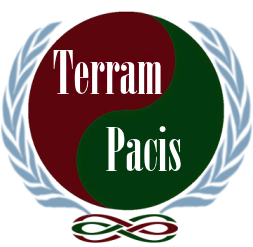

Information about the YES MOOC
In this section you find information about the main target group, the aims of the MOOC, the outcomes and the idea and the structure of the YES MOOC.
Main target group
The main target groups of the MOOC are:
- youth workers
- youth educators
- youth organisations
- YES users
- people who are interested in Serious Games
Aims of the YES MOOC
The aims of this MOOC are to
- provide youth workers, youth educators and youth organisations with insights in the tool.
- provide information how to use the Serious Game in educational contexts.
- describe the discussion models which are supported by the YES tool.
- show examples of the screens.
- provide pedagogical and didacticsl hints.
- share discussion ideas and topics.
- raise awareness for the use of Serious Games in Youth education.
Outcome
The learners/target group of this Mooc will
- learn about the rules and discussion formats of YES.
- get in touch with the concept of Serious Games.
- solve tasks to get deeper knowledge about the YES card deck game.
- focus on European topics as an example of possible topics for YES discussions.
- rethink their way of training.
- learn about the ERASMUS+ project YES.
Aims and structure of the YES-MOOC
This MOOC will make it easy for youth workers to find the YES tool and to learn about how to use it to teach their learners productive debate skills that are essential for participating in politics and active citizenship in Europe. You, the trainers and youth workers, should be able to get an idea why YES is good and useful for youth groups. That´s why we decided to provide information and learning activities about: > the idea of YES > the game formats and settings > the types of cards and an introduction to the demo card sets > the structure and the course of the game (Screenshots and descriptions) > the importance of preparation and follow-up sequences > the link to our Website and to the YES Tool
So, let´s start!
Introduction
When we are talking about modern and innovative ways of learning, game-based approaches and serious games are becoming more and more popular and every generation has its own needs. The young people are living in a quickly changing digital world. They are used to modern technology and old traditional forms of learning are not looked upon as attractive as they used to be. That´s why digital game based learning has become more and more popular over the years. Just a look at the use of smart phones, tablets and computers in the daily life of youth provides several good reasons for this. The YES approach, which we present in this MOOC, is such an innovative learning opportunity, which takes the changes in possibilities and the environment into account: YES is a serious game which supports discussions processes. Learning always happens with the resources. Moreover, learning processes usually happen under time restrictions. Overall, it can be stated that the basic conditions of learnings are very different. In addition to that, it is the duty of youth workers, teachers and trainers to prepare the young learners. The learners deal with new media in their daily life and they are involved in a European international environment. So, they have to deal with the opportunities and challenges they face in their real life environments. The young people are embedded in situations in society and the labour market and there mobile devices and new media have already a fixed place. They are standard and part of an increasing trend of digitisation. Learners should be prepared for standard situations and that´s why we decided to provide teachers and trainers with this book on new developments and dealing with mobil learning in teaching and learning scenarios. Teachers have to become aquainted to new media and innovative game-based learning approaches: So, welcome to the YES-MOOC.
About the ERASMUS+ YES project
This MOOC is focussing on the YES Serious Game. And, this game was designed in the YES project.

The project was funded by the European Union:

To get more information about this project you can have a look at the YES project website:
The main objective of YES?
The main objective of YES is to create, implement, test, and evaluate a game-based online tool and system (like a deck-building card game) for debating European topics in teams. In YES, the system proposed is a game-based tool in form of a beautifully animated online card-game that aims to encourage debates about politics and society amongst youths. Youths will form teams that could consist of school classes or mixed international teams.
The system essentially offers an online-environment for holding well-structured debates about societal or political issues that uses a gamification approach to encourage young people of different ages to get involved. Therefore, a card-game mechanism that foresees the learners to build teams to play against each other builds the very basis of the system.
Why creating a game/tool for youth with such a specific topic?
Due to the current political events, such as terrorist attacks at various places, BREXIT, the euro crisis or the migration problem, it is of particular importance that the youth realizes that they as citizens of Europe have an influence on the future and therefore Europe, too. They as a unit have the opportunity create the future of Europe or more likely that they are the future of Europe and that they should participate to lead the lives they want in the future. To ensure this one way could be to present and include them in current situations in Europe is to give them a playful opportunity to increase their knowledge and their opinion on certain European matters such as the YES tool does.
The main idea of YES? The YES tool provides a learning method in the field of Game-Based Learning. The basic idea of the YES serious game in this project, is to foster active citizenship and provide information about Europe and offer active work and discussion on a game-based approach. The teams have to prepare their own deck of cards with different statements that are appropriate to strengthen or defend one's own position creating cards with special functions (such as argument and counter-argument). This makes the whole system highly flexible as there isn't any limit in the number of teams that are playing against each other nor is it in the number of young people gathering to build a team. “Games and serious games as well, are a massive part of youth work, they provide a chance to introduce people, have fun energize youngsters, but also has an important aspect of education, based on learning by doing principle.” (Beutner, Jakunaite, Rüscher 2018)
The aims of YES: Which skills and competences will be fostered with YES?
First of all, the young learner get topic related knowledge. They discuss a specific topic when they use the YES tool. The topic can be selected by the youth workers / trainers and the learners. So the learners gather knowledge and competences and become skilled in the chosen topic. YES focused European Citizenship and politics by creating the demo Card Decks in this fields. For young European people it is useful and important to become active citizens, to know about European ideas, European culture and co-operation. But, the youth workers and learners can also integrate other topics in the game. Beside of the knowledge about the selected topic which will be discussed through YES, youngsters will also gain very important additional competencies:
- Communication in the mother tongue
- Communication in foreign languages
- Mathematical competence and basic competences in science and technology
- Digital competence
- Learning to learn Competence
- Social and civic competences
- Sense of initiative and entrepreneurship
- Cultural awareness and expression
What kind of debating models does YES offer?
An aim of YES is to foster certain competences and skills of youth through team interactions throughout the game. To debate/discuss various topics, in this case on the EU, enables the youth to develop or train specific skills and competences.

Discussion model, representative model as well as the election model.
- In the discussion model one team will play against another team to win the game. A discussion with pros and contras of a certain topic will take place. One team taking the pro-side as the other team takes the contra-side.
- In the representative model a debate with up to five different teams will take place. Each team will be represented by a single person which will argue on a certain position regarding a pre-determined topic. Such a setting is comparable to a talk-show or TV debate.
- In the election model a debate with up to five different teams will take place to simulate an election, this has to be handled in some kind of split-session by the tool.
Multiple-Choice concerning dicussion models
How many discussion models do we have in the Serious Game YES? (!1) (!2) (3) (!4)
...
Text task concerning Card Deck Games
"In the YES Serious Game we are learning to prepare discussions and discuss topics within a Card Deck Game.
A Card Deck Game is very common between young learners. The know it from breaks at school and from the playground.
Examples for other popular Card Deck Games are the game Magic from the US, or the Pokemon from Japan."
Using the YES Serious Game
YES is unique because it is the first time active citizenship is fostered by a game-based approach based on a deck-building card game.
There are some measures and projects which focus on active citizenship like (CIAC- CIAC – Creativity and Innovation for active citizenship,, CIVIC MIMDS, GOAL – Granting Opportunities for Active Learning, PPP - People Power Participation, VOICE – Developing citizens etc.) but the always stick to traditional courses or concept design. Only a few focus on online learning but this is typically not done in a synchronous way in these approaches. Moreover, none of these approaches include real game-based approaches and innovative online debating systems (we did a research on 30 project about active citizenship - you can find them under http://de.youropa-project.eu/projektauswahl/30-ausgewahlte-projekte/).
But, YES uses game aspects which are focusing on elements of deck-building card games with which the learners are typically familiar with and combines this with learning about Europe and active citizenship.
The young people are used to playing deck-building card games or collectable card games with real cards such as POKEMON, Yu-Gi-Oh, Digimon, Magic the Gathering, StarWars, Game of Thrones, etc. or on online platforms or apps (ASCENSION, DECK Heros etc.).
We use the motivational aspect of such a game structure which is played by millions of young kids and youths over Europe and put it in a completely new context.
Multiple-Choice concerning the use of YES
What is special about YES? (!YES is a traditional eLearning approach) (YES is a serious game which fosters the motivation.) (!YES is a video approach.) (!YES is a game with real paper cards.)
...
How the debate works
The objective of the YES is to encourage productive debates that authentically reflect the way how societal or political debates take place in real life, always having the claim to foster learning about the discussed topics in mind. There are three steps to take in the YES approach and the use of the YES game:

Hence, the first step to do would be to prepare the debate.
Research on the topic = Preparation phase
Therefore, the learners conduct research to the debate's topic, they search for background information and facts, and they have to prepare arguments and counter-arguments that will then be written down on the cards. Here, the learner gather knowledge and competences in the field they have to discuss.
This requires the learners to anticipate the argument and counter-arguments of the other teams as well which pretty much implies the extent of research necessary to undertake by each of the teams, particularly when playing with more than only two teams. But, this also shows that the research process itself and all of its outcomes are highly valuable for the learners, which is why resources of high quality, prepared materials, summaries that have been created, etc. should be stored and kept available. Prepared materials that weren't a part of the cards could also be made available to other learners or even teachers as some kind of Open Educational Resource.
The debate = discussion and game phase
In the second phase the debate itself starts after the preparation took place. When thinking of a debate in which a pro- and a contra-team compete against each other, the one side could start with an argument for their side. The other team could play a card with a counter-argument that specifically targets the argument that was drawn before. Deciding which card to play is a democratic process which has a time limit (as mentioned in the noted above). When it's the team's turn the members can choose which card to play and once they have a majority the card will be turned over and added to the official timeline of the debate. This will encourage discussions among the team members. At the end of each game can be public voting (election model). Instead of just asking to vote for a winner the trainer also should focus the votes on the quality of the elements produced and how well they compare against the other one. This way we can come up with a point system that will tell us who won the debate at the end of all the rounds.
The debriefing = reflection phase
The reflection is an important part for youth groups as well. The trainers discuss with their youth groups the discussion and the argumentation path. They reflect on the topic and share experiences. If the learners were for example discussing on a European topic, this is the point were additional material can be provided because now the group is open for news and is able to improve their arguments, ideas and can enhance their competences and knowledge. Moreover, different views and positions can be taken into account and a reflection about argumentation strategies can be provided.
General hints and technical aspects
The fact that teams will have to anticipate the arguments of the other side means that they will have to look at the debated topics from more than one side in order to be successful. Not only will they learn structured, respectful and productive debating skills, they will also develop a deep understanding of the topics that they debate.
From a technical point of view the system is hosted on a server. There is no need to download software or plug-ins because the system will run in every modern browser and is therefore, easily accessible.
Multiple-Choice concerning the YES debates
How many phases are there in a typical use of YES? (!1) (!2) (3) (!4)
...
The YES Cards of a deck
There are different types of Cards in the YES Card deck game:
The core dabating cards
Argument cards: to provide a first argument in a dabate
Counter argument cards: to provide an answer to a giver argument and provide a new own argument based on that
The special cards
Time card: to get some time to do additional research before providing an answer
Lie Card: Lying and Protesting it looks like a core dabating card and offers the chance to provide a wrong statement for example a so called ´scientic information´ which fosters your argumentation but which is not real and correct. If this card is played the other group can uncover it by a protest:
- If the protest is correct and it was a lie. The lying group looses the round of the debate immedialtely.
- If there is a protest and the card played was not a lie card but a real argument the protesting group looses immediately.
- If there is no protest the card is like a real argument.
Stealing Card
offers the opportunity to steal a dabating card of the other group
Destroying Card
offers the opportunity to destroy a card you like of the other group which gets out of the debate
Recycling Card
offers the opportunity to get back an agurment you already played
Crossword concerning cards
Click with your mouse on the numbers of the crossword and you will get a dialog with the question and a chance to fill in the correct answer.
| Lie | If you play this card the other group will be able to protest against it! |
| Destroying | If you play this card you will delete a card of the enemy group! |
| Stealing | If you play this card you will take a card from the opponent! |
| Time | If you play this card you won´t have to hurry any more! |
| Recycling | If you play this card you will be able to get an already played card back! |
How to register for the YES Serious Game
Video - How to register for the YES Serious Game
Find here a video concerning the registration at the YES Game:
´Search and Find´ concerning the registration
- Find the words! (horizontal, vertical and diagonal)
- To show a word, just go with your mouse on it and mark it.
- Help: We are searching for the words: Serious, Game, register, name, email, gamemaster, YES, and login.
| Serious |
| Game |
| register |
| name |
| gamemaster |
| YES |
| login |
...
Video: Introduction to the YES Serious Game
Find here a video concerning the YES Game and how it works. It provides information how to play it:
Screenshots from the YES Serious Game
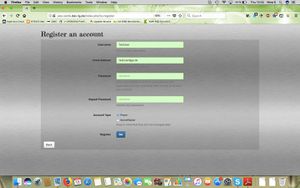


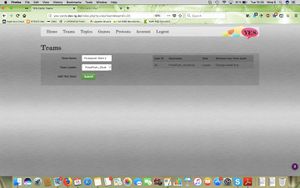
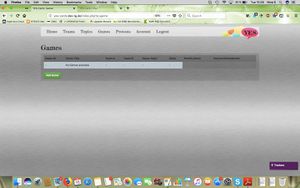


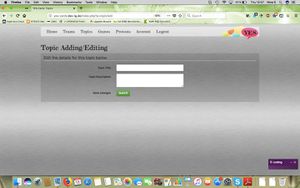
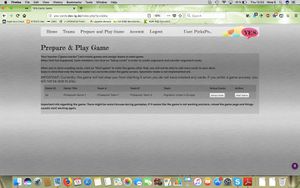
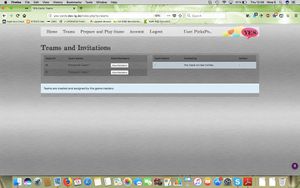
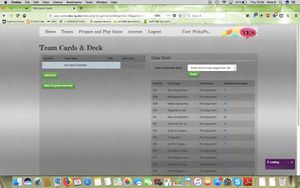

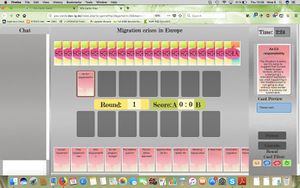

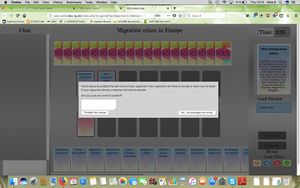
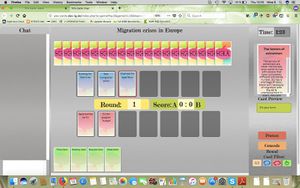
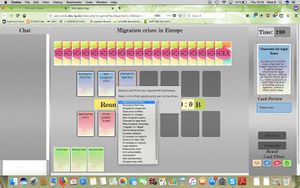
Good bye and the link to the YES Serious Game
Thank you for your interest in the YES MOOC.
Now enjoy the MOOC Game.
Just follow this Link to the YES Serious Game: